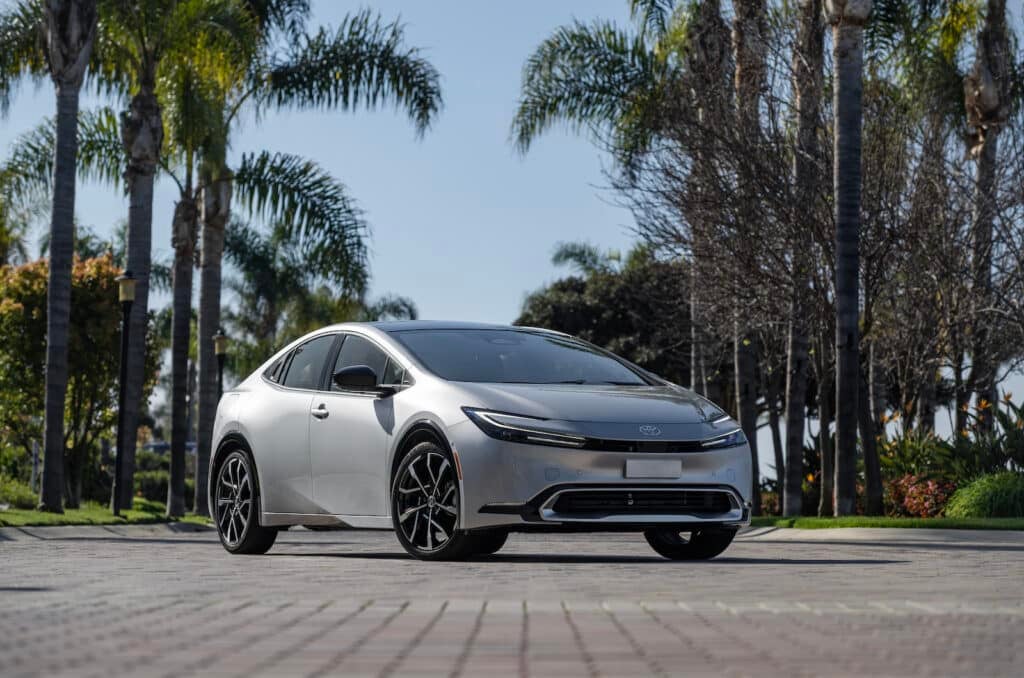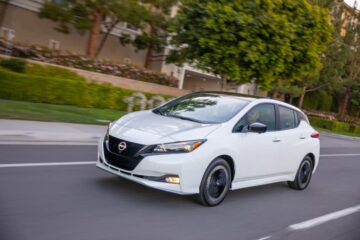The Toyota Prius has always played the dork, a four-wheeled geek that returned exceptional fuel economy. When it debuted more than two years ago, it looked as if it had landed intact from somewhere past the Solar System. Such oddity served its constituency just fine when its extreme fuel efficiency was a unique selling proposition. But then a funny thing happened. Toyota began offering hybrid driveline across its entire product lineup.

Suddenly, the dork had trouble finding a friendly buyer much like the high school geek has trouble getting a date to senior prom. But just as yesterday’s dork transforms into tomorrow’s cutting-edge millionaire, so too has the Prius transformed into a fun-to-drive, good-looking hatchback.
Overview
Whereas the 2023 Toyota Prius is a conventional gas-electric hybrid, one that never has to be plugged in, the 2023 Toyota Prius Prime does have to be plugged in, if only to deliver has much as 44 miles of pure electric driving range.
If you’re familiar with Toyota’s trim nomenclature, you’ll notice the company is only offering the 2023 Prius Prime in sportier-oriented trim, including base SE, mid-level XSE and top-of-the-line XSE Premium trim. Last year’s comfort-oriented LE and XLE trims are no more.
Exterior

Built using the second generation of Toyota’s TNGA-C architecture, the Prius Prime is 2 inches longer, an inch wider, and an inch lower than the 2022 model, but retains the Prius’ trademark hatchback body with none of the hideous design cues from the outgoing model. Although it features five doors, the Prius Prime has a coupe-like appearance, with distinctive hook-shaped headlamps connected by a small horizontal grille. Its designed is recalled by the rear horizontal taillight bar.
Overall, is design makes for a far more fetching proposition, one that’s attractive for the first time in the model’s history. You no longer need a white cane with red tip to buy one.
Interior
Climb inside, and you’ll be forgiven if you get a sense of déjà vu, as the instrument panel’s design looks much like that of the all-electric Toyota bZ4X battery electric SUV. It breaks with Prius tradition by mounting the 7-inch digital instrument cluster in front of the driver, while the shifter moves from the instrument panel to the center console. It’s almost — gulp — normal. Some drivers may find, however, that the gauge cluster is mounted so high, it’s blocked by the steering wheel rim.
If anything could be said of previous Prius Prime interiors, it’s that every effort seemed to made to save weight and cost. The new cabin sports far less offensive hard plastic, with the sort of affordable yet deceptively upmarket trim seen in recent Corollas. It imparts a far less parsimonious feel.

While the front seats prove comfortable, rear seat headroom is dearer than before. Cargo space is rated at 20.3 cubic feet, expanding to 26.7 cubic feet with the rear seats folded.
Powertrain
The Toyota Prius has been known for its efficiency, not its speed. But that’s changed for 2023, particularly on the Prius Prime. While the conventional 2023 Prius is rated at 193 horsepower, up from a measly 121 horsepower in 2022, the Prius Prime generates 220 hp, a 100-hp improvement, good enough to reach 60 mph in 6.6 seconds — astonishingly fast for Prius.
That said, the SE and its 17-inch wheels returns 600 miles of range and 44 miles of battery-electric range, while the XSE and XSE Premium’s 19-inch rubber cuts that to 550 miles and 39 miles. Similarly, the SE is EPA-rated at 52 mpg in combined city/highway driving, versus 48 mpg for the XSE and XSE Premium. But the latter allows you to options like standard heated and ventilated front seats and optional heated rear seats.
The Prius Prime’s battery can be fully recharged in about four hours using 240-volts, or 11 hours with a common 120-volt plug. And if you can’t plug it in, the Prius Prime runs like a conventional hybrid.
Safety and Technology

The National Highway Traffic Safety Administration hasn’t rated the 2023 Toyota Prius Prime, but thankfully, the Insurance Institute for Highway Safety has, designating it a “Top Safety Pick+,” its top rating.
But if that’s not good enough for you, consider that the Prius Prime is equipped with Toyota Safety Sense 3.0, which includes a standard Pre-Collision System with Pedestrian Detection, Dynamic Radar Cruise Control, Lane Departure Alert with Steering Assist, Lane Tracing Assist, Lane Change Assist, Front Cross Traffic Alert, Road Sign Assist, Automatic High Beams, Blind Spot Monitor with Rear Cross-Traffic Alert, Safe Exit Assist, Hill Start Assist, Parking Assist and Proactive Driving Assist.
The Prius Prime is also equipped with the automaker’s Star Safety System, which brings with it Stability Control, Traction Control, Anti-lock Brakes, Electronic Brake-force Distribution, Brake Assist, Smart Stop Technology, and eight airbags.
So yeah, you’ll be safe.

An 8-inch infotainment touchscreen is standard, while a 12.3-inch display is optional on XSE, and standard on the XSE Premium. Thoughtfully, the Prius Prime comes with wireless Android Auto and Apple CarPlay and six USB-C ports.
Driving Impressions
The Prius Prime’s added ponies make it swift and receptive. And while it remains planted when hustling through the twisties, the reality is that this is not a sports car. But this new-generation Prius Prime is considerably more enjoyable to drive, thanks to its lower center of gravity, a relocated fuel tank and the hatchback’s overall reduced height. Additionally, the steering is quicker and provides greater road feel, making it fun-to-drive, something you’d never say of any previous Prius. Even the CVT transmission, never a fave, didn’t prevent this Prius from zipping willingly through traffic.
So while fuel economy may be your motivating factor to buy it, you’ll be impressed by its willing fluid athleticism. That said, rear visibility could be better, and stronger regenerative braking would be appreciated.
2023 Toyota Prius Prime XSE Premium Specifications
| Dimension | Dimensions: L: 185.9 inches/W: 71.9 inches/H: 56.9 inches/Wheelbase: 112 inches |
| Weight | 4,096 pounds |
| Powertrain | 2.0-liter turbo 16-valve I-4 with permanent magnet electric motor; 8-speed automatic, AWD |
| Fuel Economy | 27 mpg combined |
| Performance Specs | 288 horsepower and 310 pound-feet of torque |
| Price | Base price: $43,300; As tested: $56,990 |
| On-Sale Date | Available now |
Wrap Up
As hybrid models proliferated across the Toyota lineup, causing the Prius’ sales to crater, it seemed as if the Prius was destined for oblivion. But trading some practicality for sporty style and handling, while adding power without sacrificing its legendary fuel efficiency has transformed the Prius into something unique in the U.S. market.
While differing from its original identity, it stands out as a unique offering, one well worth considering, particularly in plug-in Prime trim.
2023 Toyota Prius Prime – Frequently Asked Questions
What’s the difference between the 2023 Prius in the 2023 Prius Prime?
Mostly, it’s the powertrain. The Prius is a conventional gas-hybrid with a 4-cylinder gas engine paired with an electric motor to improve fuel economy. In contrast, the Prius Prime is a plug-in gas-electric hybrid that travels up to 44 miles powered solely by electricity.
What is the gas mileage on the Prius Prime 2023?
Most models return 50 mpg in city driving, 47 mpg in highway driving, and 48 mpg in combined city/highway driving, although the base SE model returns 53 mpg city, 51 highway and 52 combined.
How fast does 2023 Prius Prime charge?
About four hours using 240 volts, 11 hours using a standard 110-volt outlet.
- SEO Powered Content & PR Distribution. Get Amplified Today.
- PlatoData.Network Vertical Generative Ai. Empower Yourself. Access Here.
- PlatoAiStream. Web3 Intelligence. Knowledge Amplified. Access Here.
- PlatoESG. Automotive / EVs, Carbon, CleanTech, Energy, Environment, Solar, Waste Management. Access Here.
- PlatoHealth. Biotech and Clinical Trials Intelligence. Access Here.
- ChartPrime. Elevate your Trading Game with ChartPrime. Access Here.
- BlockOffsets. Modernizing Environmental Offset Ownership. Access Here.
- Source: https://www.thedetroitbureau.com/reviews/a-week-with-2023-toyota-prius-prime/
- :has
- :is
- :not
- $UP
- 11
- 12
- 121
- 20
- 2022
- 2023
- 220
- 26
- 300
- 39
- 50
- 51
- 60
- 7
- 9
- 990
- a
- About
- across
- added
- adding
- Additionally
- administration
- affordable
- ago
- Alert
- allows
- almost
- also
- Although
- always
- an
- and
- android
- any
- anything
- Apple
- appreciated
- architecture
- ARE
- AS
- asked
- assist
- At
- attractive
- auto
- Automatic
- bar
- base
- battery
- BE
- been
- before
- began
- Better
- between
- blind
- blocked
- body
- breaks
- Brings
- Bureau
- but
- buy
- BUYER..
- by
- CAN
- car
- Cargo
- causing
- Center
- change
- changed
- charge
- City
- Cluster
- combined
- comes
- comfortable
- Common
- company
- connected
- Consider
- considerably
- considering
- Console
- contrast
- control
- conventional
- Cost
- could
- Cross
- cruise
- cuts
- cutting-edge
- Date
- debuted
- deliver
- Design
- designed
- destined
- Detection
- difference
- differing
- digital
- Display
- distinctive
- distribution
- does
- doors
- drive
- driver
- drivers
- driving
- dynamic
- economy
- efficiency
- effort
- eight
- Electric
- electric motor
- electricity
- Electronic
- Engine
- enjoyable
- enough
- Entire
- equipped
- Even
- Every
- exceptional
- Exit
- expanding
- expands
- extreme
- factor
- fairly
- familiar
- far
- FAST
- Features
- feel
- Feet
- Find
- finding
- fine
- First
- first time
- five
- fluid
- For
- four
- frequently
- friendly
- from
- front
- Fuel
- fuel efficiency
- fully
- funny
- GAS
- gauge
- Geek
- generates
- generation
- get
- getting
- good
- gravity
- greater
- had
- Handling
- happened
- Hard
- Have
- height
- High
- Highway
- highway safety
- history
- Horizontal
- HOURS
- However
- HP
- HTTPS
- hustling
- Hybrid
- Identity
- if
- impressed
- improve
- improvement
- in
- inches
- includes
- Including
- inside
- Institute
- instrument
- insurance
- into
- IT
- ITS
- jpg
- just
- known
- Lane
- Last
- legendary
- less
- like
- lineup
- longer
- looked
- LOOKS
- lower
- made
- make
- MAKES
- Making
- Market
- max-width
- May..
- Millionaire
- model
- models
- Monitor
- more
- Motor
- moves
- much
- National
- Need
- never
- New
- no
- None
- normal
- Notice..
- of
- offensive
- offering
- on
- ONE
- only
- Options
- or
- original
- out
- outlet
- overall
- paired
- panel
- parking
- particularly
- past
- permanent
- plastic
- plato
- Plato Data Intelligence
- PlatoData
- played
- plug
- Plugged
- ports
- power
- powered
- Premium
- prevent
- previous
- price
- Prime
- Proactive
- Product
- proposition
- Prove
- provides
- quicker
- radar
- range
- rated
- rating
- reach
- Reality
- recent
- Red
- Reduced
- regenerative
- Relocated
- remains
- reminiscent
- retains
- return
- returns
- road
- rubber
- runs
- s
- sacrificing
- safe
- Safety
- Said
- sales
- Save
- say
- School
- Second
- Second Generation
- seconds
- seemed
- seen
- Selling
- senior
- sense
- sign
- significantly
- Similarly
- SIX
- small
- smart
- So
- solar
- Solar system
- solely
- some
- something
- somewhere
- Space
- speed
- Sports
- Spot
- Stability
- standard
- stands
- Star
- start
- steering
- steering wheel
- Stop
- stronger
- style
- such
- SWIFT
- system
- tank
- Technology
- tested
- than
- thanks
- that
- The
- then
- thing
- this
- Through
- time
- tip
- to
- too
- top
- Touchscreen
- toyota
- Tracing
- traction
- trademark
- Trading
- tradition
- traffic
- transformed
- transforms
- travels
- trouble
- two
- u.s.
- unique
- USB-C
- using
- Versus
- visibility
- was
- week
- weight
- WELL
- Wheel
- when
- which
- while
- white
- wider
- willing
- willingly
- wireless
- with
- without
- worth
- would
- years
- yet
- you
- Your
- zephyrnet












